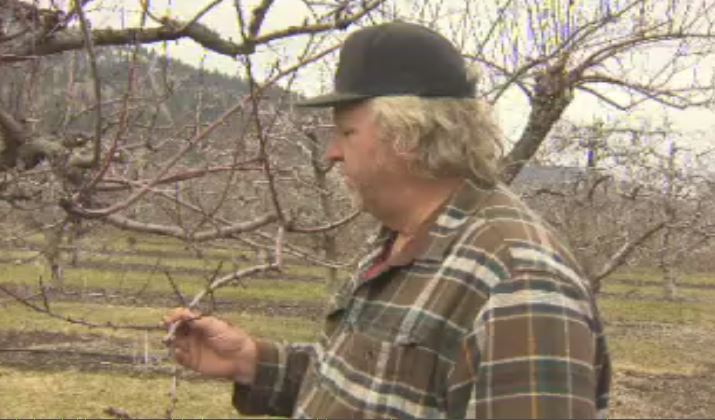Al Gatzke’s apricot trees were all but decimated by January’s deep freeze.

The Lake Country orchardist grows all kinds of fruit on his 25-acre property.
“Peaches, prunes, nectarines, sweet plum, sour plums, specialty fruits,” Gatzke said. “We also grow half a dozen kinds of berries.”
Some species were wiped out entirely. Others were partially destroyed depending on where in the orchard they were situated.
“Our peaches down by the water, there’s a half a crop in there, Gatzke said. “The cherries look pretty good, like maybe even 90 per cent but a quarter mile away and up the hill, it’s 90 per cent the other way around.”
Whether it’s frigid cold snaps or scorching heat, Gatzke said modifications to government support programs are needed to reflect more frequent extreme weather events and their impact on farming.
“The impacts of climate and the programs that were developed are from a different era,” he said.
He believes better water management measures are also needed to help growers get through droughts.

He used spring run-off as an example saying some of that water should be captured to moisten the soil early in the season.

Get breaking National news
“Freshet is the time of year when the snow is melting and it’s spilling over the dams and it’s going into the lakes and we can’t capture it anymore,” he said.
“If we have good moisture and the heat comes and hits us and the fire departments start sucking the pressure out of the lines to put out the wildfires, I can actually survive two weeks. Two inches of water in my soil reserve is how much I apply in two weeks and that can get us through.”
The B.C. Fruit Growers’ Association (BCFGA) is all for it and has been advocating for this type of water management for some time.
“There are things in the irrigation system called water turn on and turn off days and really, we should be looking at the climate to figure out when to turn it on and off not just saying it’s May first and you can turn on the water,” said Glen Lucas, general manager for the BCFGA. “We should say, ‘It’s a warm spring, let’s not waste this water going down through the Okanagan River. Let’s capture some of it and get it onto our land, build up that soil moisture when it’s available.”
Gatzke will be among the farmers meeting with district officials later this week to discuss water management and new technology available to test ground moisture.
“Helping the farmers to understand the importance of soil moisture ahead of the season before that heat dome comes and the advancement in technology that is coming to the forefront now,” Gatzke said. “A sensor at three feet deep and another sensor at one foot deep…you know what’s going on in April and you can prepare for the summer.”
With B.C. in for another potentially dry summer, the tools up for discussion could help more crops survive and thrive even during extreme weather.
“The city and the farmers need to come closer together because the solution to drought management is cooperation between the biggest water users and also the purveyors of it,” Gatzke said.









Comments
Want to discuss? Please read our Commenting Policy first.